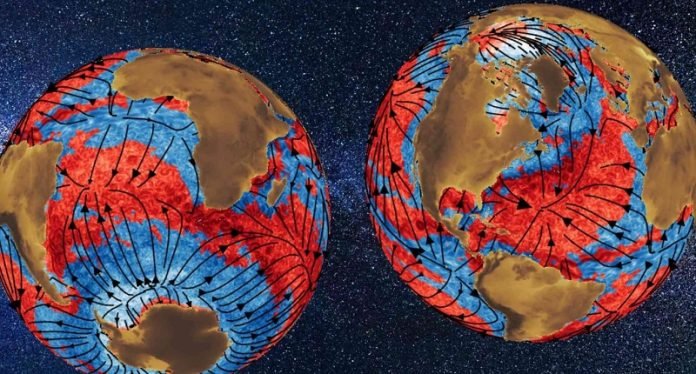
In a groundbreaking discovery, scientists have found crucial evidence showing a surprising link between the ocean’s weather patterns and the climate all over our planet.
This important research, led by Hussein Aluie, an expert from the University of Rochester, and his team, was recently published in the journal Science Advances.
What’s Happening in the Ocean?
Just like the weather we see and feel on land, the ocean has its own weather systems. However, these are different in size and duration.
Benjamin Storer, a key researcher in the team, explains that while a typical weather pattern on land might last a few days and stretch over 500 kilometers, ocean weather, like swirling water patterns called eddies, can last up to four weeks but are much smaller in size.
Why is This Discovery Important?
For a long time, scientists have thought that these ocean patterns might be talking to the larger climate system, but it was always a bit of a mystery.
How do you even start to unravel such a complex puzzle? Aluie and his team developed a special mathematical method that allowed them to study how energy moves in different patterns in the ocean, ranging from global scales down to areas as small as 10 kilometers.
By applying this method to detailed ocean data from advanced climate models and satellite observations, they uncovered something unexpected.
The Surprising Link Between Ocean and Climate
Their findings show that these ocean weather systems both gain and lose energy when they interact with larger climate patterns.
Interestingly, the way this happens reflects the way air circulates all over the globe. The team discovered that a specific atmospheric zone near the equator, known for producing a lot of the world’s rain, plays a big role in transferring energy and stirring up ocean turbulence.
Storer and Aluie emphasize that studying these intricate movements of water at multiple scales is challenging but offers a fresh perspective compared to previous methods of linking weather to climate change.
Their approach is more about understanding the mechanics of how things work, which helps in getting clearer insights into cause and effect.
This critical research involved a global team, including Michele Buzzicotti from the University of Rome Tor Vergata, Hemant Khatri from the University of Liverpool, and Stephen Griffies from Princeton. The project received support from various organizations, including the National Science Foundation, NASA, and the US Department of Energy.
This study is not just about understanding the ocean better; it’s about gaining new insights into the entire climate system.
With the increasing interest in how global warming and climate change are affecting extreme weather events, this research provides a promising new way to understand these complex interactions.
By diving deep into the mysteries of the ocean, scientists are bringing us closer to unraveling the secrets of our planet’s climate.



